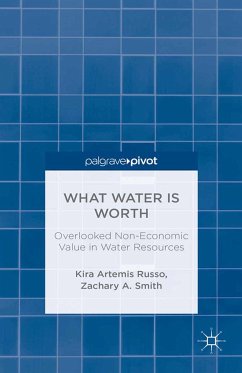K. Russo, Z. Smith
What Water Is Worth: Overlooked Non-Economic Value in Water Resources (eBook, PDF)
73,95 €
73,95 €
inkl. MwSt.
Sofort per Download lieferbar

37 °P sammeln
73,95 €
Als Download kaufen

73,95 €
inkl. MwSt.
Sofort per Download lieferbar

37 °P sammeln
Jetzt verschenken
Alle Infos zum eBook verschenken
73,95 €
inkl. MwSt.
Sofort per Download lieferbar
Alle Infos zum eBook verschenken

37 °P sammeln
K. Russo, Z. Smith
What Water Is Worth: Overlooked Non-Economic Value in Water Resources (eBook, PDF)
- Format: PDF
- Merkliste
- Auf die Merkliste
- Bewerten Bewerten
- Teilen
- Produkt teilen
- Produkterinnerung
- Produkterinnerung

Bitte loggen Sie sich zunächst in Ihr Kundenkonto ein oder registrieren Sie sich bei
bücher.de, um das eBook-Abo tolino select nutzen zu können.
Hier können Sie sich einloggen
Hier können Sie sich einloggen
Sie sind bereits eingeloggt. Klicken Sie auf 2. tolino select Abo, um fortzufahren.

Bitte loggen Sie sich zunächst in Ihr Kundenkonto ein oder registrieren Sie sich bei bücher.de, um das eBook-Abo tolino select nutzen zu können.
What Water is Worth addresses both conventional and non-conventional values of water, discussing the value of water as it relates to conventional microeconomics, water's true utility and government regulation, and new and current practices in water management.
- Geräte: PC
- ohne Kopierschutz
- eBook Hilfe
- Größe: 1.42MB
Andere Kunden interessierten sich auch für
![Economic Growth Versus the Environment (eBook, PDF) Economic Growth Versus the Environment (eBook, PDF)]() J. CherniEconomic Growth Versus the Environment (eBook, PDF)73,95 €
J. CherniEconomic Growth Versus the Environment (eBook, PDF)73,95 €![Nuclear Or Not? (eBook, PDF) Nuclear Or Not? (eBook, PDF)]() Nuclear Or Not? (eBook, PDF)73,95 €
Nuclear Or Not? (eBook, PDF)73,95 €![Govering for the Environment (eBook, PDF) Govering for the Environment (eBook, PDF)]() Govering for the Environment (eBook, PDF)73,95 €
Govering for the Environment (eBook, PDF)73,95 €![Understanding Global Environmental Politics (eBook, PDF) Understanding Global Environmental Politics (eBook, PDF)]() M. PatersonUnderstanding Global Environmental Politics (eBook, PDF)73,95 €
M. PatersonUnderstanding Global Environmental Politics (eBook, PDF)73,95 €![Transboundary Environmental Problems and Cultural Theory (eBook, PDF) Transboundary Environmental Problems and Cultural Theory (eBook, PDF)]() Na NaTransboundary Environmental Problems and Cultural Theory (eBook, PDF)73,95 €
Na NaTransboundary Environmental Problems and Cultural Theory (eBook, PDF)73,95 €![Global Commodity Governance (eBook, PDF) Global Commodity Governance (eBook, PDF)]() F. GaleGlobal Commodity Governance (eBook, PDF)40,95 €
F. GaleGlobal Commodity Governance (eBook, PDF)40,95 €![Living in a Low-Carbon Society in 2050 (eBook, PDF) Living in a Low-Carbon Society in 2050 (eBook, PDF)]() Living in a Low-Carbon Society in 2050 (eBook, PDF)40,95 €
Living in a Low-Carbon Society in 2050 (eBook, PDF)40,95 €-
-
-
What Water is Worth addresses both conventional and non-conventional values of water, discussing the value of water as it relates to conventional microeconomics, water's true utility and government regulation, and new and current practices in water management.
Dieser Download kann aus rechtlichen Gründen nur mit Rechnungsadresse in A, B, BG, CY, CZ, D, DK, EW, E, FIN, F, GR, HR, H, IRL, I, LT, L, LR, M, NL, PL, P, R, S, SLO, SK ausgeliefert werden.
Produktdetails
- Produktdetails
- Verlag: Palgrave Macmillan US
- Seitenzahl: 104
- Erscheinungstermin: 22. Oktober 2013
- Englisch
- ISBN-13: 9781137062499
- Artikelnr.: 46753883
- Verlag: Palgrave Macmillan US
- Seitenzahl: 104
- Erscheinungstermin: 22. Oktober 2013
- Englisch
- ISBN-13: 9781137062499
- Artikelnr.: 46753883
- Herstellerkennzeichnung Die Herstellerinformationen sind derzeit nicht verfügbar.
Kira Artemis Russo received a B.S. in broadcast communication and an M.A. in history from California State University, Sacramento. She received a second M.A. and a Ph.D. from the Department of Politics and International Affairs at Northern Arizona University. She focuses on environmental policy, particularly water resources. Zachary A. Smith is a Regents' Professor of Political Science at Northern Arizona University. He received his B.A. from California State University, Fullerton and his M.A. and Ph.D. from the University of California, Santa Barbara. He is a consultant both nationally and internationally on natural resource and environmental matter, and has authored numerous books and articles on environmental and natural resource policy topics.
Contents Preface 1 Conventional Values of Water Introduction: The Many Facets of Value Terminology Commodification Highlights from the Literature Conventional Values of Water Unconventional Values of Water Conservation Values Spiritual Values Policy Learning Use Values of Water The Value of Water as a Consumable Commodity Monetary Terms The Utility of Water Monetary Terms Welfare Economics Environmental Economics Cost-benefit Analysis Contingent Valuation Ecological Economics 2 Economic Grounds for Current Practices of Water Management A Starting Point: Values Sanctioned in Economics Turning Nature into Capital Water Markets and Hegemonic Powers The Indoctrination of Classical Liberalism Locke on Property Locke on Money The Indoctrination of Neoliberalism The Globalization of Trade The International Monetary Fund The World Bank The World Trade Organization Permeation of the 'Common Sense' The Common Sense of Water Marketing 3 The Millennium Ecosystem Assessment An Overview of the Millennium Ecosystem Assessment The Millennium Ecosystem Assessment- The Trend toward Inclusion of Community Values The Millennium Ecosystem Assessment- Ecosystem and Hydrologic Services Ecosystem Services Hydrologic Services The Millennium Ecosystem Assessment- Conclusions and Progress A Further Look at Ecological Economics 4 Non-Conventional Community Values of Water Non-monetary Values of Water Environmental Values of Water In-stream Values of Water Spiritual Values of Water Eastern Beliefs Jainism Hinduism Chinese Traditional Religion Buddhism Shinto Sikhism Western Beliefs Judaism Islam Christianity Ecologically-based Spiritual Beliefs Zoroastrianism Bahá'í Faith Native American Beliefs Tsalagi Inuit Native Beliefs in Arizona African Spirituality Additional Ways People Hold Spiritual Value for Water 5 Cooperative Communities: The Future of Water Management Assignments of Non-monetary Value Assignments of Non-monetary Values and Emergent Ecological Benefits Implementation Water as a Human Right The Role of Gender Education Worldwide Water Managers as Agents of Public Trust Conclusion References
Contents Preface 1 Conventional Values of Water Introduction: The Many Facets of Value Terminology Commodification Highlights from the Literature Conventional Values of Water Unconventional Values of Water Conservation Values Spiritual Values Policy Learning Use Values of Water The Value of Water as a Consumable Commodity Monetary Terms The Utility of Water Monetary Terms Welfare Economics Environmental Economics Cost-benefit Analysis Contingent Valuation Ecological Economics 2 Economic Grounds for Current Practices of Water Management A Starting Point: Values Sanctioned in Economics Turning Nature into Capital Water Markets and Hegemonic Powers The Indoctrination of Classical Liberalism Locke on Property Locke on Money The Indoctrination of Neoliberalism The Globalization of Trade The International Monetary Fund The World Bank The World Trade Organization Permeation of the 'Common Sense' The Common Sense of Water Marketing 3 The Millennium Ecosystem Assessment An Overview of the Millennium Ecosystem Assessment The Millennium Ecosystem Assessment- The Trend toward Inclusion of Community Values The Millennium Ecosystem Assessment- Ecosystem and Hydrologic Services Ecosystem Services Hydrologic Services The Millennium Ecosystem Assessment- Conclusions and Progress A Further Look at Ecological Economics 4 Non-Conventional Community Values of Water Non-monetary Values of Water Environmental Values of Water In-stream Values of Water Spiritual Values of Water Eastern Beliefs Jainism Hinduism Chinese Traditional Religion Buddhism Shinto Sikhism Western Beliefs Judaism Islam Christianity Ecologically-based Spiritual Beliefs Zoroastrianism Bahá'í Faith Native American Beliefs Tsalagi Inuit Native Beliefs in Arizona African Spirituality Additional Ways People Hold Spiritual Value for Water 5 Cooperative Communities: The Future of Water Management Assignments of Non-monetary Value Assignments of Non-monetary Values and Emergent Ecological Benefits Implementation Water as a Human Right The Role of Gender Education Worldwide Water Managers as Agents of Public Trust Conclusion References







